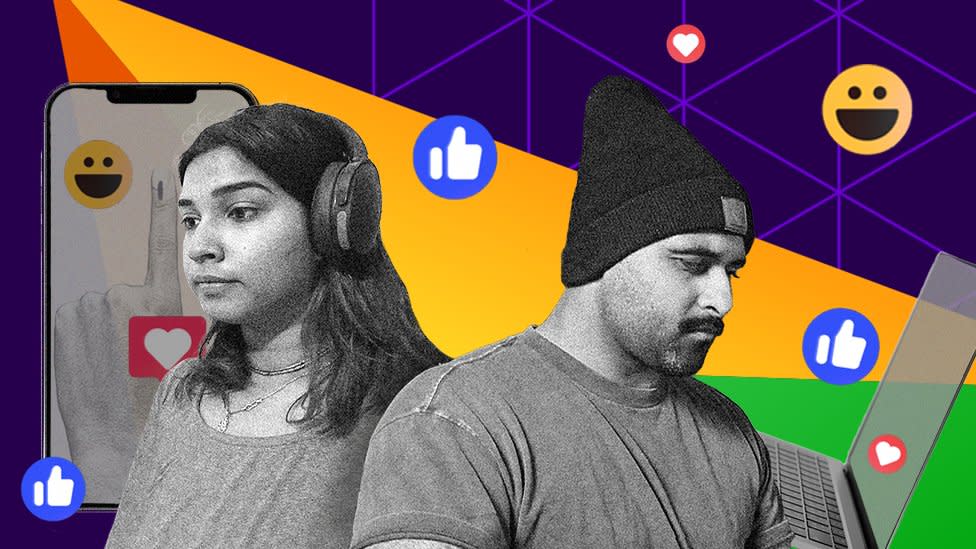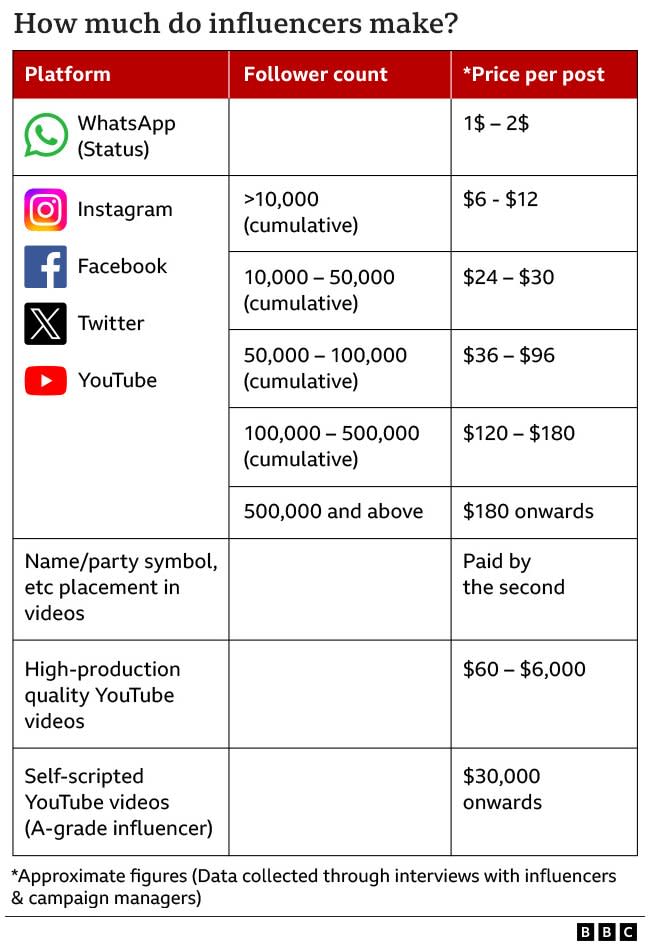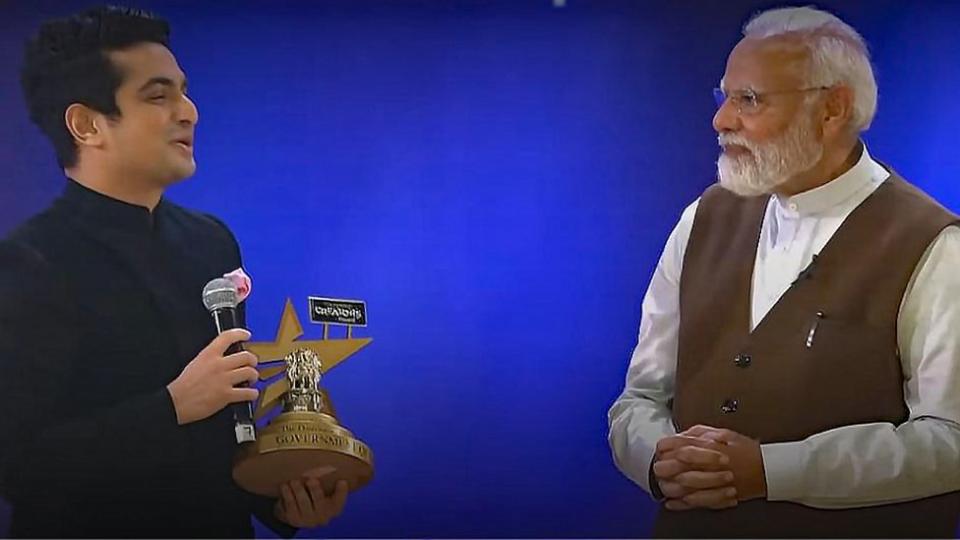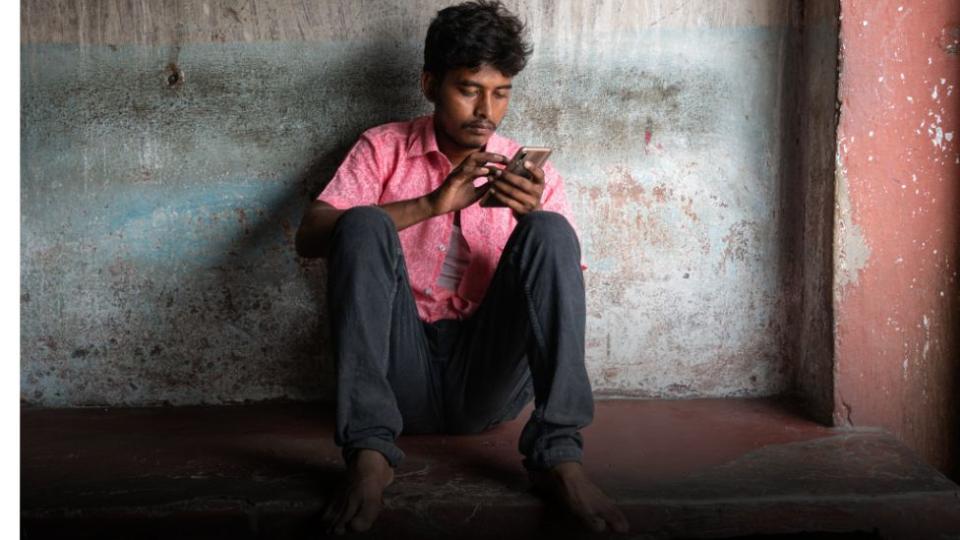Lok Sabha 2024: The influencers driving India's big election

Just weeks before the first ballot was cast in this year's Indian election, Prime Minister Narendra Modi was at an event in Delhi rubbing shoulders with people known by names like BeerBiceps and Curly Tales.
The event - an awards show, congratulating some of the country's top social media stars on their work - was an acknowledgement of the power of the influencer which a few years ago may have seemed unimaginable.
And as politicians prepared to battle it out for India's billion votes, these influencers were being lined up to play a crucial role in reaching the young, the disinterested and the disillusioned.
But even as some celebrate social media's democratisation of the media - a place where any one can share their views freely - others paint a darker picture, one where threats are rife, and the truth can be set aside for the right pay cheque.
A decade ago, you would have struggled to find anyone calling themselves an "influencer".
But now, says Vinay Deshpande, co-founder of Rajneethi, a political management consultant firm, "it's become a profession".
"I know teenagers who are doing this part-time to earn pocket money."
Pocket money underplays the earning potential somewhat, however. At the lower end, people can charge around 2,000 rupees ($24; £19) a day, but top influencers can pull in about 500,000 rupees for a post - equivalent to the monthly salary of someone in top-level management.
The creator of the Ranting Gola channel revealed to the BBC that political parties and election management firms have offered as much as "100,000 to 500,000 rupees for a single campaign".
It is no small amount - but then, it could turn the tide in a candidate's favour.

Mr Deshpande says they have helped an opposition candidate win an assembly election by pushing out content through a curated list of local influencers with a small but active following.
"Social media content is powerful and can influence the way a person feels about an issue," Mr Deshpande says. "It gives social currency to a belief or opinion - but this can lead to a lack of critical thinking about an issue," he adds.
Preethi Aggarwal, 25, is one of those who turns to apps like Instagram, YouTube and Twitter to help her understand the news.
Like thousands of others, Ms Aggarwal follows a bunch of "political influencers", or people who talk about politics on social media to "really understand what's going on".
"News can get boring and complicated sometimes. I think these people [influencers] make it fun and easier to understand," she says, adding the context and their own perspective help her form her opinions.
But the problem is, whose perspective is she getting?

YouTuber Samdish Bhatia reveals numerous politicians have reached out to him, especially in the months before this election, offering him millions of rupees to interview them.
"But they wanted me to share questions in advance or get the video approved before it's published," he says, adding that he declined the offers because he "likes to maintain editorial control".
The particular trend for longer form, slightly chummy interviews - where politicians get to show off their human side - is particularly vulnerable to management, says Joyojeet Pal, an associate professor at the University of Michigan.
"Many of these interviews are carefully managed by politicians," Mr Pal says.
But even if they aren't, a gentler style of questioning can also blur the line between interview and promotion, says Mr Pal.
"If your questions aren't holding power to account, then the interview just becomes a platform for easy publicity."
But for Mr Pal, this is just one of the problems he sees with politics on social media.
In a recent research paper, he examined some of India's top influencers and who they interviewed, finding BJP leaders were featured more often than opposition leaders.
His research also found an overall drop in the number of accounts posting content critical of the incumbent government in recent years, while the amount of pro-BJP content had increased.
"This hints at a growing hesitancy among people to be openly critical of the government whereas there seems to be more confidence in putting up polarising content or content that supports the government's ideologies," Mr Pal says.
"And this is dangerous for democracy," he adds.

Influencers supporting the opposition certainly suggested they were working in a hostile environment.
A number who post content that's critical of the government declined to speak to the BBC for this piece citing fear of repercussions by the government. They also run their channels under pseudonyms to keep their identities secret.
The Ranting Gola told the BBC that she has often received comments that are abusive or threatening because of the videos she posts and that her Instagram account has been disabled numerous times, even though the platform hasn't given her a clear reason for doing so.
She also only spoke to the BBC on the condition that her name not be revealed.
The BJP government has denied allegations that it has clamped down on dissent and free speech.
But even pro-BJP YouTuber Sham Sharma told the BBC that freedom of speech could be a problem in India:
But even given these concerns, opposition parties are using the same influencer system to reach voters in what they say is a difficult environment.
"The mainstream media has been taken over by the BJP," alleges Supriya Srinate, who heads social media for the Congress party.
"Our funds have been frozen; we have no money to advertise," she adds, referring to action taken by India's tax department weeks before the elections. Congress leaders have accused the government of political vendetta, but the government has denied the allegation and said that the federal department was doing its job independently.
Influencers, Ms Srinate argues, are a good way to reach voters as a result of these alleged hurdles, explaining the Congress has been working with "volunteers" who believe in the party's ideology and want to share its work on social media.
Ankit Lal, former political advisor of the opposition Aam Aadmi Party (AAP), agrees that influencers have helped democratise the publicity landscape.
Akash Banerjee, a former journalist who runs the YouTube channel, The DeshBhakt, argues that influencers are also able to push boundaries more than the traditional media can.
He cites the video 'Is India becoming a dictatorship?' - made by popular content creator Dhruv Rathee, who is based in Germany - which takes on the government directly, and has been viewed about 24 million times on YouTube so far. The government hasn't reacted to the video yet.
"After the video, the term 'dictatorship' has popped up more in conversations, and this is something that has never happened before," Mr Banerjee says.
"Our job as influencers may not be to open the window and check if it's really raining, but we owe it to the nation to take a look outside the window and let people know if dark clouds are approaching and that they can do something about it by voting."



